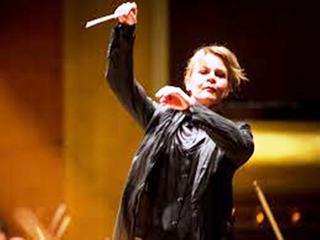|
Back
Two Philosophers and a Dream New York
David Geffen Auditorium, Lincoln Center
10/18/2019 - & October 19*, 22, 2019
Joseph Haydn: Symphony No.22 in E-flat major (“The Philosopher”), Hob. I:22
Unsuk Chin: Su: Concerto for Sheng and Orchestra
Richard Strauss: Also sprach Zarathustra, Opus 30
Wu Wei (Sheng)
New York Philharmonic Orchestra, Susanna Mälkki (Conductor)

S. Mälkki
“If I were not a physicist, I would probably be a musician. I often think in music. I live my daydreams in music. I see my life in terms of music.”
Albert Einstein (1879-1955)
“Music is a dream which I am unable to hear.”
Ludwig van Beethoven (1770-1827)
Twenty-five minutes before the NY Phil premiere of Unsuk Chin’s Su: Concerto for Sheng and Orchestra, the music started.
That is, the percussion ensemble of the New York Philharmonic started tuning up their cowbells, tom-toms, tenor drums, frame drums, sandpaper, water gongs, thunder sheets, Javanese gongs etc etc. Not to omit their twig brush. The program might end with Richard Strauss’s Tone Poem for Large Orchestra. But when it comes to huge ensembles, no living composer is better than Unsuk Chin.
Back to this great composer–who confesses that her inspiration comes inevitably from dreams–later. More earthly music, the music of philosophy, pre-empted and post-empted Ms. Chin’s work.
Susanna Mälkki is always welcome on her visits from Finland, and she was in the most beatific mood for Haydn’s “Philosopher” Symphony. Granted, Papa Haydn may have had his own image for the opening movement, but the walking theme and incredibly unusual double horn/double cor anglais chorale for the opening has always been considered “philosophical”.
The Symphony is not difficult in recording. But to have a glitchless set of horns live is an achievement which transcends mere philosophy, and the Phil’s horns did the trick. The conductor took all the repeats, led the whole orchestra with grace and contemplation, and this lovely movement (the best of the four-movement work) came out with pensive triumph. The three more vigorous succeeding movements were certainly attractive, though hardly as noteworthy.
The second philosopher was hardly nameless. In fact, as Alex Ross pointed out in last week’s wonderful New Yorker piece, Friedrich Nietzsche has been construed and misconstrued for two centuries, having written enough words to be quoted and misquoted for centuries to come.
Richard Strauss had no problem here. As the composer of A Hero’s Life in his early 30’s, he obviously considered himself the Ubermensch incarnate. Taking a few aphorisms from Zarathustra suited him as well as the Uber-Apes of 2001.
It suited Ms. Mälkki in a well-paced reading. The opening was not overpowering but it was distinguished. The Dance Song swirled, the Song of the Night Wanderer was eloquent enough. The problem with this whole performance was that being subtle with Strauss is a losing proposition. Yes, discipline is essential, but so is the sense of wildness, even frenzy. Ms. Mälkki last night was worthy of great respect, but one longed for the mystic and the madness.

W. Wei/U. Chin
Back to Unsuk Chin and her sheng concerto. My personal thoughts about the sheng are confounded. I used to be a virtuoso on its Laotian cousin, the khene, but Mr. Wu Wei’s instrument, all fixed up with more keys, more pipes and more sensitive mouthpiece is comparing a feather-quill to a computer. Add to this, the confusion that the sound of the sheng is wheezy, accordion-like, though Mr. Wei gives it a plethora of different sounds.
Yet Mr. Wei is a decided virtuoso (both Tan Dun and John Cage have written for him, he has performed with Baroque and contemporary groups), he is delightful to watch, with dance movements with sudden vocal utterances.
The final judgment has to be based on Unsuk Chin, who confesses to “dreaming” her inspiration, whose previous works are equally beautiful and utterly demanding, but who is always fascinating.
As in Su, not a Korean word but the ancient Egyptian god for “air”, pronounced “Shu”. It is indeed a concerto of sorts, with Mr. Wei producing a whole 20 minutes of cadenzas with the orchestra. And while the structure is, to say the least, amorphous, the entire piece has a huge variety of textures, which, with the Phil, makes for a utterly fascinating work.
While I could be missing something, Su seemed more like a suite of attached movements. Mr. Wei commenced with sustained tones, the strings adding to the depth of the orchestra. And now continued a fantasia of sheng acrobatics, with all those percussive instruments, played softly or racketing loudly.
One didn’t have to interpret or follow the structure, for this was a glorious tapestry of color and sizzle, light, darkness and at the end not a bang, but–with the final notes played by the sheng with strings in the highest balcony of David Geffen Hall–a whisper.
It was terrific stuff with a terrific solo encore, and light-years away from the usual moaning sheng for Chinese opera. Wu Wei, like Unsuk Chin, lives in Germany. Both of them add a dimension to so-called Western music, coming from the finger-dexterity and breath of one, and the fantastic dreams and breadth of the other.
Harry Rolnick
|